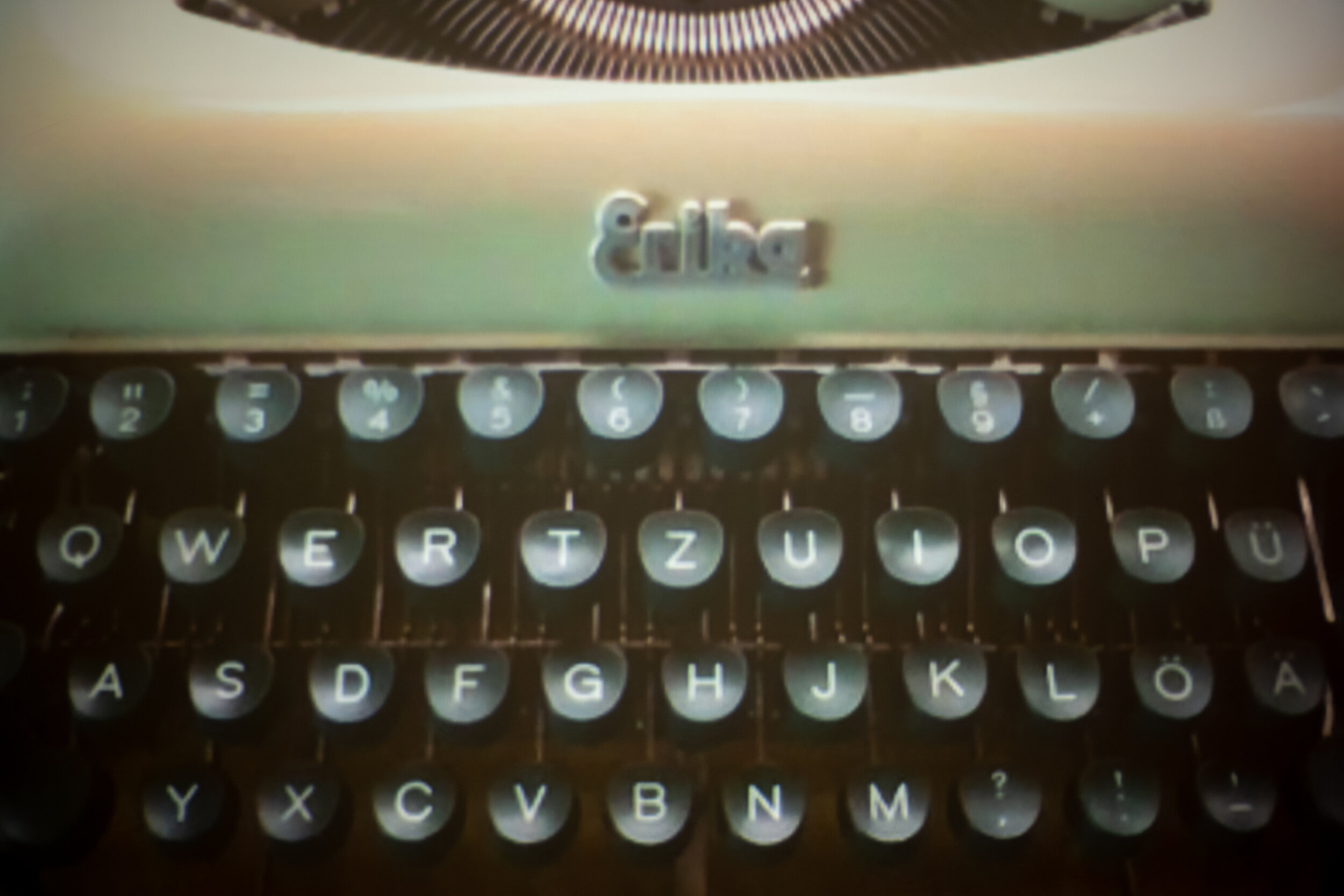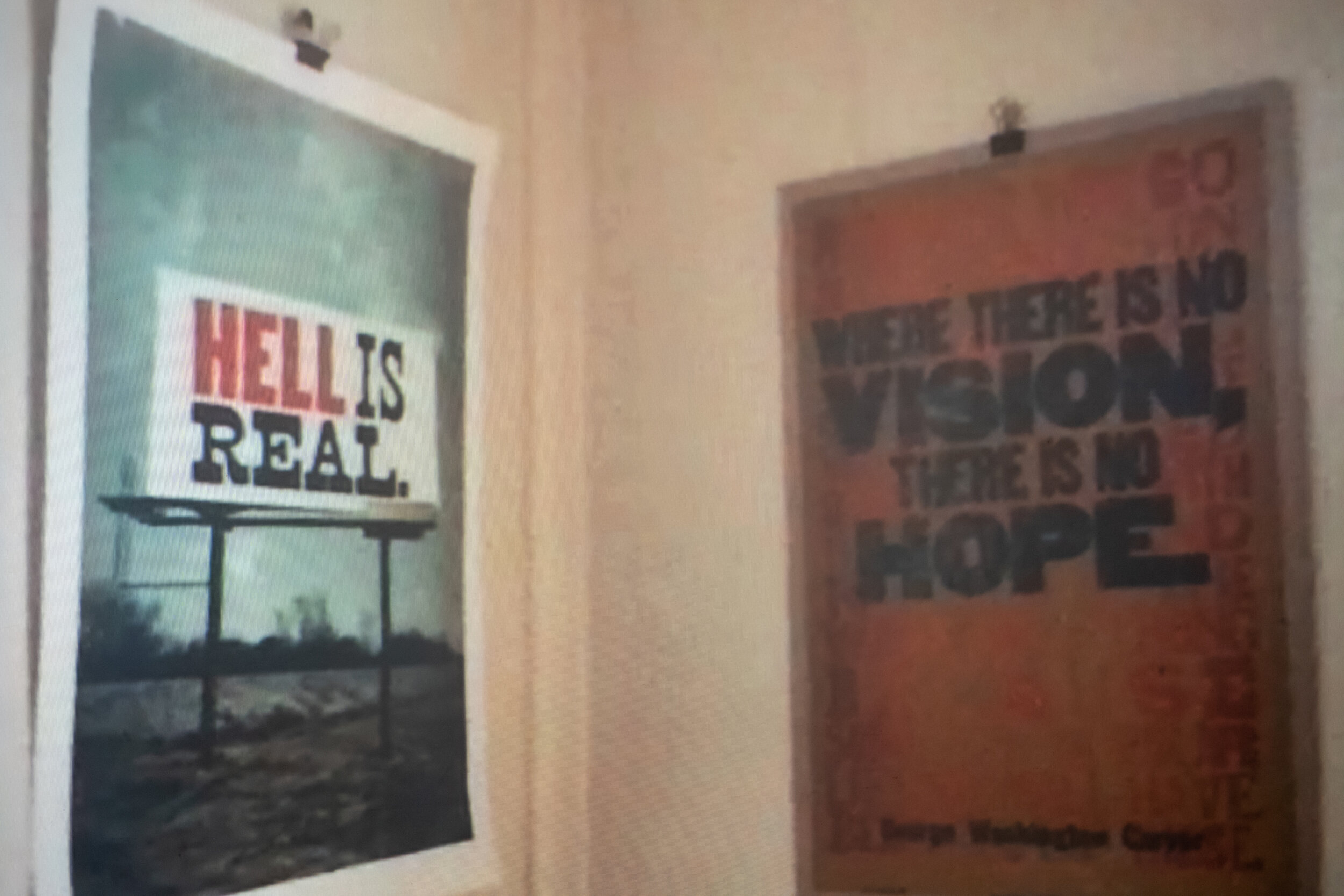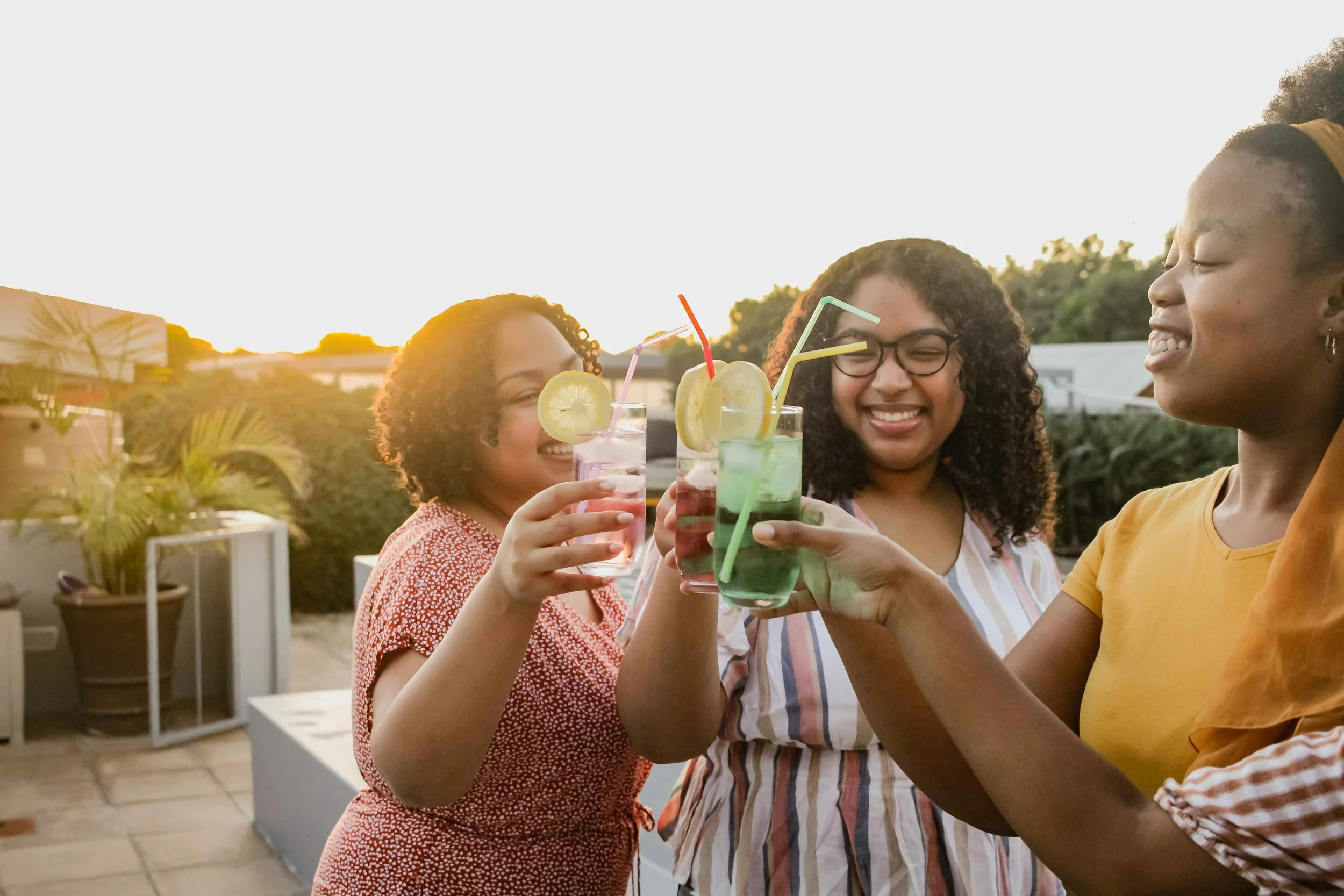The Art of Good Questions
Remote Portraits by Dave Cooper
Interview by Jen Cooper
“I think a good question has movement, a propulsion of its own and should instinctively encourage action.”
It’s a Wednesday evening and I’m sitting in my basement looking at a larger-than-life image of artist, writer, and bookmaking goddess, e bond that’s projected on the wall.
Her mother named her e, one lowercase letter, so people wouldn’t be able to judge her before meeting her. It was the gift of a blank slate. Which is something I wonder if e thinks about a lot. The offering of a blank slate in which she gets to create her own version of herself.
It’s what I use e’s books for. She makes beautiful journals and sketchbooks inspired by nature, words, and paint marks. I pour parts of myself into one every morning so I can see what I look like more clearly. But, I’m snapped out of my thoughts as I spy the black panthers on her coveralls. “Oh, I love those!” I say.
e laughs and says she’s all about anything that allows movement. Which I know is a fashion choice, but it feels like maybe it’s a life choice as well. For instance, she teaches a personal mapmaking class through Creativebug that, according to the site, “shows you how to re-imagine a map as a visual journey through your artistic and emotional places.”
What are maps about if not movement? Showing us where we’ve been and where to go.
And her 100-Day Project this year, #100questionsworthasking was a series of questions typed out on an old typewriter. I think about the movement of the keys hitting the paper—that tactile sensation, that flow, that physical connection to movement so many of us miss now that we spend our days swiping up or down or typing across a flat screen, devoid of texture.
e gives us a tour of her Bay Area home, moving this way and that. There’s a section for working online, and a section for working offline. It dawns on me that we’re both inside each other’s homes, even if it’s virtually, and my mind wants to sort out what that means about our ability to connect beyond touch. Instead, I shift my weight in my seat and break out my questions.
I love the way you see the world. From your intense appreciation for the life of trees to the idea that our lives are ripe for mapmaking—and that those maps can all look different and exquisite. Tell me about the mapmaking class you teach. What prompted it?
I’d been playing around with this loose idea of trying to map emotions as landscapes for some time, oddly enough as a way back into poetry, if that makes any sense. In grad school, I worked a lot with trying to re-write and diagram definitions of words into what they ‘really meant’, and I think this mapping was a slight echo of those thoughts. How can I describe the indescribable? How can I say what’s being felt, but is left off the page?
In both cases I was trying to use my stronger muscle (art) to inform my weaker one (writing). I was thinking maybe I could employ images where words failed, and then push the needle the other way once I figured out a process that might work. I think visualizing words for me was akin to visualizing maps in that both were acting as placeholders for something else. And trying to depict the 'something else' was what I was/am reaching for.
It’s funny I was just listening to a Masterclass on poetry by Billy Collins and I think he clarified a piece of what I had been feeling around in the dark for. He talked about poems acting as the definition of an emotion that we don’t know the name for. Just like there are a million shades of yellow, poems can be the physical depiction of a million different emotions in the human condition that we feel, but cannot define… Something in that sits perfectly with what I’ve been trying to wrestle with in map form.
But anyway, (I think I just interrupted my own thought while typing… ) I think what I was saying was I didn’t really know how to come at that problem of ‘mapping a feeling’, maybe it felt too large, so I decided to make it a 100 day exercise where I would explore what mapping could hold if I broadened its meaning on all sides. I had so much fun with that project, so when I was approached to write a class for Creativebug I jumped at the chance to explore it further. I think map making is essentially a way into all making for me. I’m pretty obsessed with process, so I am always trying to think of tools, ideas, metaphors for understanding the creative process. That’s where the questions project stems from as well.
What are some of the challenges your students face in creating their maps?
Hmm, I don’t know. Maybe I should ask them that question. Somehow I think this might be symptomatic of the online class experience. Students can see me making but I don’t get to see them in the mode of making. I only see what has been made. So many of these natural process questions that would organically arise in a classroom don’t happen as easily. I’ll have to remember that.
What's a challenge you face in creating your own?
So many challenges. I am trying to decipher intention as it kind of slips away from me. Because emotion isn’t fixed. Then there’s questions about form; am I inventing the space, or am I defining one that exists but just isn’t visible? Am I trying to pin down a feeling in time like a map is fixed and accurate only for a short span of time? Can the forms hold time inside of them?
Can we talk about your 100 question series? I can’t tell you how much I look forward to them. They’re all incredibly deep, moving, and shifting. Does that make sense? Like, I feel a literal shift in my brain where it’s like train tracks at a junction. I was heading one way, but now I’m going to see a whole new place. Where did this idea come from?
Aw, thank you. It does make sense and I appreciate you saying that as I am trying to punctuate 're-framing' in this work. How do I write questions that can shift perspective? How do I create a narrative of questions that can build upon one another to move someone through an event, even if the event is unnamed? Can they be broad and specific enough at the same time?
I have been working on the questions for so long I can’t even remember when exactly it began. It started as just this thing I would do… I used to collect sentences, then I started collecting questions. But then I was realizing that I wasn’t just collecting them, I was generating them as a way to get through my thesis work they were very crucial to my actual process..So then a few years go by and I write and give a talk at a conference about ‘questions as a creative process,’ and it all starts to gel for me, “Ok, this is how I am navigating my work, could this work for other people?”
So what you are seeing now as the 100 question series is basically all these things aligning and becoming more clear one day a time.
And also finally sharing these ideas to see what it invokes in other people. Because questions are in itself an invitation, it felt like I had to find a forum to start inviting, in order to see what the project wanted it to be. I know what I want it to be, but maybe I have to wait and listen to what the work wants.
What makes a good question?
The more I work with questions, the more I think a good question is ultimately one that leads to another and is infinite in its curiosity so the giver nor the recipient feel fixed in any way. I think a good question has movement, a propulsion of its own and should instinctively encourage action.
But you know, I've noticed recently how questions also have temperatures and maybe roles. I’m starting to understand that a little more.
How some are meant to incite, ignite, begin something, and others are good for drilling down, I don’t necessarily understand it all yet, but it’s kind of exciting.
You hold an MFA in writing. Are you writing now?
I am slowly writing again. I’m having these talks with writing, and some days I am winning.
What holds you back?
Lack of physical space re: my artwork. Lack of faith in my process re: my writing.
Oh! And the oh so fun ‘Does this even matter anymore?’ that has come 'round of late. But that’s a very new feeling in light of where we are emotionally as a species. That last one is colored in a very real urgent grief of the moment.
What/Who moves you forward?
Muscle memory.
What’s a question you’ve always wished people asked but never do?
If you had to choose, what do you love more: beginnings, middles or ends? And why?










